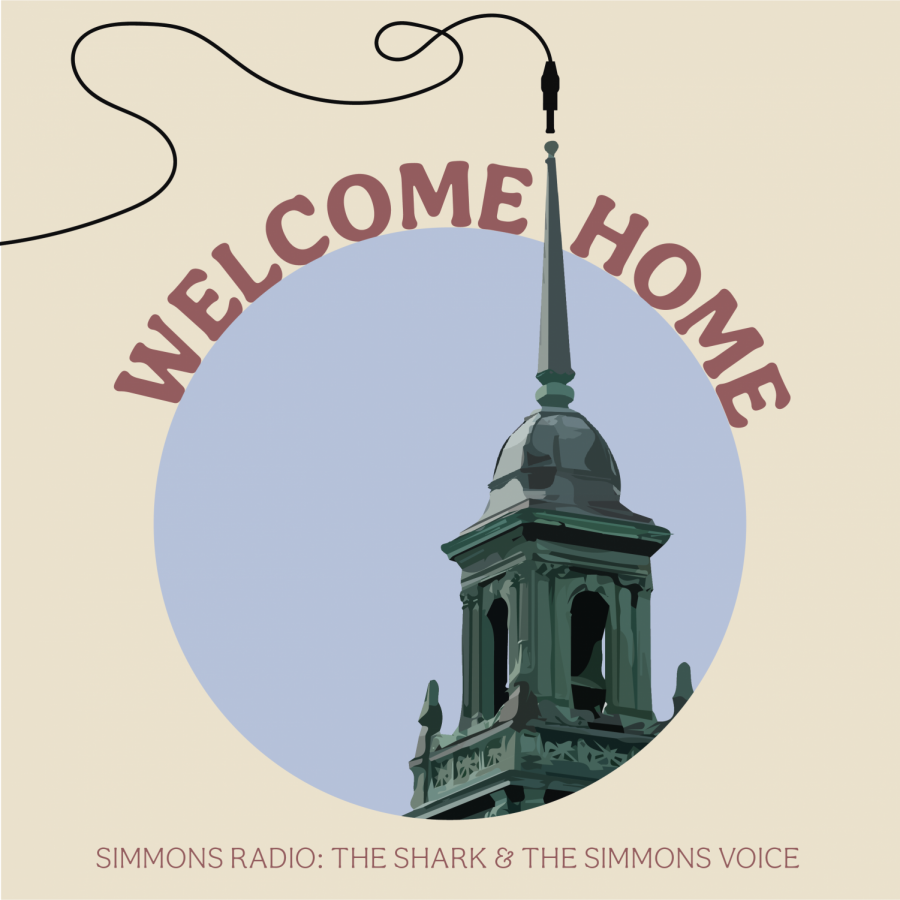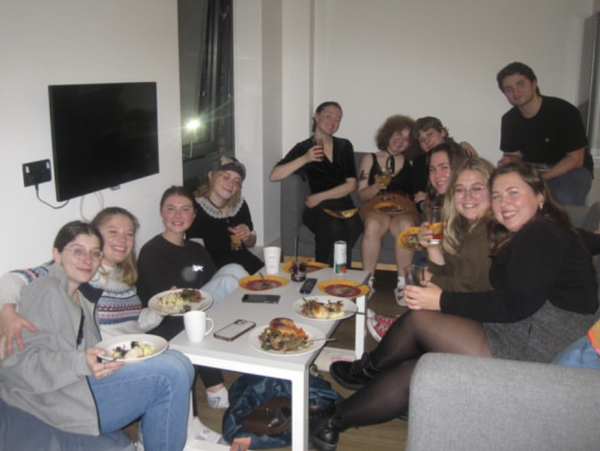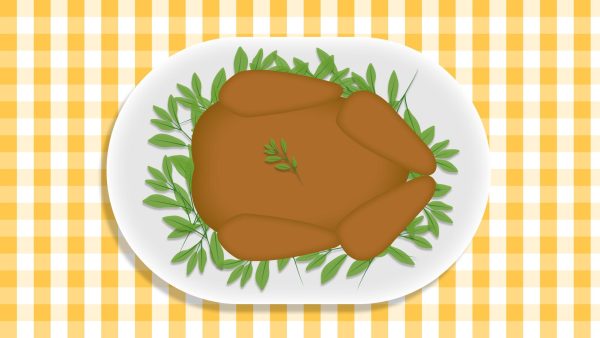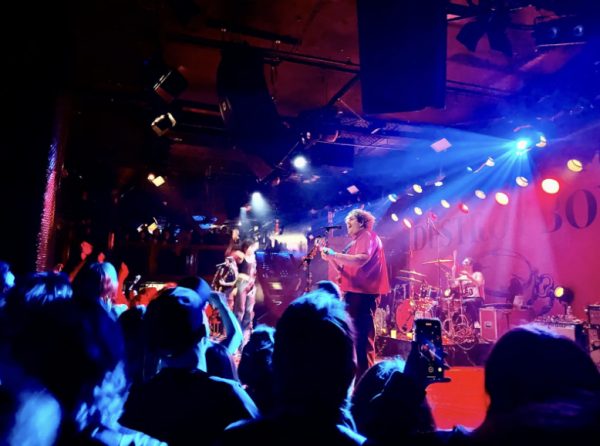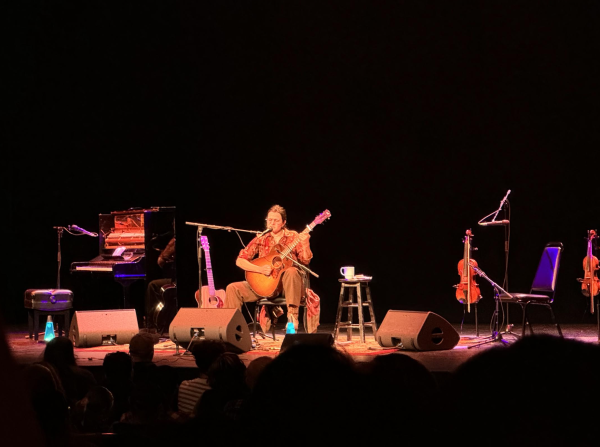Welcome Home S2E3: A Slow Return to Normalcy – Transcribed
March 15, 2021
INTRODUCTION MUSIC BEGINS TO PLAY
ANNOUNCER – Welcome Home. From Simmons Radio: The Shark and The Simmons Voice, this is Welcome Home. A show about news, culture, and stories that impact Simmons University. No matter where you are we’ll keep you updated on what’s happening at home.
Sarah Carlon –Welcome back to Welcome Home. My name is Sarah Carlon, and I use she/her pronouns.
Katie Cole – My name is Katie Cole. I use she/her/hers pronouns.
Iz Indelicato – And my name is Iz Indelicato. And I use they or she pronouns. We’ve got a very exciting episode today, lots of things to talk about. So we might as well jump right into it.
Katie Cole – Yeah, let’s jump right into it. So there are signs that things are returning to somewhat normal on Simmons’ campus. The Simmons admissions office has begun offering in-person tours for prospective students in-person tours began March 2. I spoke with the director of admissions Kate Innes about this and she said there has been a lot of interest from families wanting to take tours. Currently, tours are only offered to admitted students because they are making their college decisions soon. And they want to see the physical space on campus before they commit. Innes told me they put a whole host of safety measures in place to protect both the Simmons community and the visiting students. Tours are limited to one family per tour. Visitors are required to double mask and tour guides are fitted with N-95 masks. They also bought little microphones for the tour guides to wear so that prospective students can hear them while keeping six feet apart. Innes said that they also had to create a new route for tours. This is because admissions didn’t want visitors to cross-contaminate with students on campus. And also because Simmons is currently undergoing construction. So the new route takes visitors into the Park Science and Palace Road buildings and around the quad on academic campus but not really into any other buildings because a lot of them are under construction. Visitors also tour the residential campus. As you know students are currently living on residential campus so the interim director of Residence Life Amelia McConnell said that the University had to be very intentional about the tour routes and protocols that they put in place to keep students safe. Tours are allowed to go around the residential quad and into Simmons Hall, which is currently completely unoccupied by students.
Sarah Carlon – How many different tour guides are there? Are a lot of Simmons students being tour guides or is it just a few?
Katie Cole – Yeah, so they have about four to six tour guides being both Campus Ambassadors and staff from the admissions office. I actually spoke to a current Campus Ambassador Hayley Arnold and she is a senior she’s been a Campus Ambassador since her sophomore year. And she said that she’s really excited to give tours again, because this is going to be her last sense of normalcy on Simmons campus because she’s graduating this year. So this is going to be basically like the last regular Simmons thing that she gets to do. She said that maybe like last fall, if you had told her that her last normal thing would be giving tours in her senior year, she would have been really disappointed. But now she’s kind of accepted that things have completely changed. And you have to change what you are excited about and you have to shift your baseline, you have to change your goals.
Iz Indelicato – Yeah, no, sort of what you said about Hayley’s sort of like the disappointment that she would have felt last fall, but now kind of heralding in the new the new wave of Simmons students. So that’s definitely an interesting point.
Katie Cole – Yeah, I think a lot of students – Innes said that there are a lot of students who are really interested in being on campus and they haven’t even opened it to the larger community of prospective students. They’re just talking to admitted students right now. So there’s definitely a lot of interest to see what the physical space of Simmons is all about, especially if there’s a chance that we could be in person in the fall.
Iz Indelicato – Katie, going off of what you said about the excitement that folks have to be back on campus on March 5, Res Life, sent an email announcing that Simmons would be allowing 30 more students to come live on campus, and an interview that I had with interim director of residential life Amelia McConnell, she explained that the decisions for more students to be allowed on campus has always been an option. So as Katie reported earlier this year fall semester that residence halls will be opened to 50% capacity, meaning around 500 students. So currently, there are 180 students living on campus, and McConnell explained that as people’s circumstances have changed, and we’ve gotten into the spring semester and have adapted a bit more students may feel better about living on campus, or are more excited to live on campus, which is why they opened up those 30 spots. Junior student, Ailia Rochefort moved on to Simmons campus before the start of the spring semester because she wanted to be in the city and sort of have more of a college experience. And she’s currently living in suite style living. And she thinks that Simmons is doing a good job in terms of COVID safety, and that the protocols are pretty easy to follow. And it seems like students are taking things seriously. So I asked her if she had any concern about if more students came on campus if that feeling of safety or protocols would change. And Ailia said that she’s not feeling that way, and Amelia McConnell also said that with the system that they have in place, and how well it’s it’s been going for students and how well Simmons students are following the protocols. She’s not concerned about that either. And something that I found pretty interesting is that during the fall semester, there were over 80 conduct reports for not following COVID-19 guidelines. And there were far less students than the 180 that are on campus right now. So adapting sort of protocols and figuring out the best methods for keeping students safe on campus seems to be proving effective. And it’ll be interesting to see if those 30 on-campus spaces which are on a first come first serve basis will fill up as we are in the middle of March. And there is only a half a semester left. So it will be definitely interesting to see what happens with that.
Katie Cole – Yeah, I really wonder if students are going to kind of take up that opportunity to live on campus again. For me personally, it’d be a hard sell to move halfway through the semester. But I will be really interested to see if some students take take the opportunity.
Sarah Carlon – I feel like also there’s a lot to be said for Internet access too, and just kind of having your own space. Where I’m living at home right now, I do have my own room. I have my own workspace, but some folks can’t always say the same. So I can imagine that it would be good to have like your own workspace in your own area and dependable internet access. We kind of opened this episode with it seems like a sense of normalcy is starting to come back, which is definitely really exciting.
Iz Indelicato – Sarah, as you said, we are seemingly sort of headed to a place of normalcy. Vaccine rollout is definitely something that people are looking forward to. And again, the warmer weather just kind of allowing for us folks in New England to be able to socialize with one another. And this is very exciting information and things to look forward to especially as we are at the one-year mark of the COVDI-19 pandemic and everything really shutting down. However, as we as we reach this point there are those feelings of hope, but according to experts that I spoke with, we could be seeing a widespread anniversary reaction. An anniversary reaction is defined as a “unique set of unsettling feelings, thoughts or memories that occur on the anniversary of a significant experience, according to Psychology Today. These anniversary reactions can manifest in multiple ways… emptiness, irritability, anxiety, an overall sense of feeling unsettled, and so much more, it can really manifest differently for different people. Dr. Hugo Kamya is a professor at the Simmons School of Social Work, and his scholarly and practice interests include trauma in children and families and health disparities. And he said that it’s not uncommon for people to have an anniversaryanni reaction of one kind or another to traumatic events such as this pandemic. While, external reminders such as seeingnews, notifications, or things on social media make it nearly impossible to be unaware that we’re at this one year mark, the interesting thing about these anniversary reactions is that your body can just kind of know based off of the weather and the time of year and the season. So I think that’s definitely something that’s super interesting to keep in mind. And experiencing these feelings of trauma being recreated for the first time can be distressing, which is why identifying the cause is an important part of coping and getting through the reaction.
Sarah Carlon – It’s just funny how you said how Dr. Kamya noted that like even changes in the weather can bring about stuff like that, because I know a couple days ago, I was outside doing yard work and I got like this wave of sadness, and not like nostalgia, but I was thinking of myself a year prior probably to that exact day doing the same thing and just kind of being unaware of like what was going to happen and having a lot of anxiety and confusion and fear around the pandemic. You know, we still didn’t quite know what was going on. So it’s just interesting that even the weather like stuff like that, March, it’s simultaneously like, “yes, it’s gonna be warm and spring.” But also, I was getting these memories like, Oh my gosh, a year ago at this time, I was just basically trying to cope.
Katie Cole – Yeah, Sarah, thank you so much for sharing that. I really appreciate it. And I know that we had put up a poll on our Instagram story or a question sticker on the Voice’s Instagram story to ask students how they were feeling about hitting this one-year mark of the pandemic. Iz can you share some of the responses that you found most pressing?
Iz Indelicato – Yeah, absolutely Katie. We got a bunch of different responses. A lot of the the key words that we got were grief, isolation, things feeling surreal, anxiety, sadness, nostalgia, exhaustion, kind of all all across the board. And Dr. Kamya said that not only are our feelings, negative feelings that people feeling about the pandemic at its core, but it’s also everything that has come along with the pandemic in this past year, which he said was sort of a domino effect as as this has impacted people’s finances, home life, and an overall sense of security with their lives. And Dr. Daniel O’Brien, a public policy and urban affairs professor at Northeastern University, who is leading a study on the effects of the COVID-19 pandemic on Bostonians said that multiple different factors including disparities of different socioeconomic statuses, housing security, races, and the list goes on and on can definitely contribute to the way that the pandemic is affecting people. And specifically with the college student demographic Kamya said that he’s seen an increase in stress, anxiety and the development of depressive symptoms in students with some even engaging in self harming behaviors due to the psychological effects of the pandemic. And he said that this can really affect student’s relationship with schoolwork, tests, quizzes, grades, all of that, which can further those distressing feelings. And while those things such as grades and schoolwork and things may seem minuscule, they can tap into painful and vulnerable places for students.
Katie Cole – Okay, Iz, knowing all of this harsh reality of what trauma reactions are, what are some ways that people can cope with trauma reactions?
Iz Indelicato – That’s a really good question. So in talking to Dr. O’Brien and Dr. Kamya, I sort of made a little list of different things that people can do. Number one is understanding that the pandemic is a traumatic experience and that having strong emotions is a completely normal response. Kamya said that it’s important to be very kind to ourselves and show compassion to ourselves and others, and let us feel our own feelings and and not beat ourselves up about it. Number two is that it’s important to recognize that it’s going to take time to heal and process this. Dr. O’Brien said that adjusting to the new normal, whatever that may look like as we get into the warmer weather, and as vaccine rollout continues, it’s still going to be challenging because it’s a disruption to our current schedules. O’Brien says that he thinks that we’re going to see a continued internal strife persist for months, which is honestly, for me at least a little bit disappointing. But I know it’s just part of the process. And even though mental health challenges that aren’t anticipated will come up, it’s important to be talking about them with one another to sort of normalize it, so people aren’t feeling bad about feeling bad when seemingly things are getting better. Number three is finding ways to take care of yourself and process all that has taken place. So mindfulness, relaxation, maintaining a sleep schedule, getting fresh air, and exercise are all good places to start, according to Kamya. And he even suggested which I thought was really interesting, bibliotherapy, which is reading books and poetry and other literature as a way to sort of to understand the experiences that one is going through, so they don’t feel like they’re alone with them. And then something that sort of branches off from that after doing some research about bibliotherapy is journaling and just in writing as well, in order to process those feelings, which I thought was interesting. Kamya also drove home the point that it’s now more important than ever to be intentionally setting aside time for self care. Number four, this sort of also branches off of self care, at least for me, is being cognizant of what content you consume on social media and the conversations that you’re having. We might have trauma responses just based off of the weather and the seasons changing, but seeing these constant memories in front of us could also contribute to recreating some of those traumatic experiences. Something that a therapist that I know, said is getting rid of Timehop and turning off Facebook and Instagram and Snapchat memories, because seeing those pop up and see “Oh, one year ago today,” this this that and the other thing is is just not good and can pull you back pretty quickly. And last but not least, number five is finding safe methods for social interaction with others. So I’ve quoted this story multiple times, but Julia Marcus an epidemiologist and professor at Harvard Medical School said in her article for the Atlantic, that an all or nothing approach to social distancing is ineffective and can do more harm than good because it just creates a sense of shame and secrecy and humans are social beings. It’s important to be social with one another, finding a way that you can do that safely is crucial. Dr. O’Brien said that it’s a matter of finding the sweet spot about where you’re comfortable with, where you don’t feel like you’re straining in either direction, either being too lenient with restrictions, or to pull back and in your own shell. So calculating the probability of risk and what you’re comfortable with, and the risk of those around you are all very important. Kamya said that having meaningful connections with people who add to one sense of self is important in terms of returning to that mental self that that some of us may have had before the pandemic. And lastly, this one thing that Dr. Kamya said that stuck out to me is that “I think one way to look at what has happened in the past year is that we’ve been fragmented, and as fragmented people, whether emotionally, mentally, physically, that fragmentation needs to be brought back together,” adding that we need to find ways to do that authentically so we can find our center selves. Which I think is a really, again, just a poignant point to be made, especially with the fragmentation that’s happened with pandemic and in an election year and everything else that has gone on in 2020, and now 2021. So I hope that these tips can offer some help for folks or at least knowing that the feelings that they are feeling are normal. So a huge thanks to Dr. Kamya and Dr. O’Brien for taking their time to speak with me about this and share some of their insights.
So as you’ve heard before, we are always looking for ways for people to contribute and get involved in the Welcome Home podcast, The Shark, and the Voice. One of the ways that folks have been getting involved is with interviews which is what the Shark’s music director Laurel Auth did recently with Jake McKelvie of Jake McKelvie & the Countertops. Here is her interview with them and you can head over to the Shark’s podcast feed to listen to the full interview, which will be linked in this podcast description.
Katie Cole – And Simmons Radio: The Shark is also looking for Simmons musicians. The Shark at Home is an interactive and collaborative project between Simmons Radio and you! The musicians of Simmons University. So we’re looking for Simmons University musicians of any instrument, any genre, covers, originals, whatever you feel is best. You’ll be featured on the Simmons Radio IGTV and the Shark’s website. If this sounds super interesting to you, and you want to showcase your music for Simmons Radio: The Shark, you can email our music director, Laurel, her email is laurel.auth@simmons.edu.*** to get started. (NOTE: Laurel’s email address was misstated in the episode, and her correct address is laurel.auth@simmons.edu.)
Sarah Carlon – Here is Laurel with Jake McKelvie of Jake McKelvie & the Countertops. Take a listen.
Jake McKelvie – Like the better part of two years. You know, it’s kind odd
Laurel Auth – Yeah, it’s what do you how you think your band is going to return to normal? Or do you think Have you been writing at all still or just hanging out?
Jake McKelvie – Mostly hanging out? I don’t uh, yeah, I haven’t been doing a tremendous amount of writing or anything but I certainly assume that our band will will still you know, be very active once we’re able to start again. I was like I have the thought and I think there’s actual reason to believe this. I don’t think it’s too far fetched. But I like to think that we’re the band is one of those bands that just always exists. And you know, not not necessarily in a super prominent way but I feel like we could be that type of band where we just kind of we never break up and even if we don’t you know play constantly we’ll still will still be there.
Laurel Auth – That’s true friendship and I mean, you guys definitely are a staple around here. I’m I’m when I first entered the music scene in the area 21 so when I was working, I actually i bartended one of your shows once Cooper Union and I knew about you guys pretty quickly so I feel like you guys are a staple in the in at least the scene around here. I’m excited to to hear you guys play once again. And I also noticed I was looking at your Spotify and you have a ton of streams on your on your previous full length. LP is do you hope that the new one is gonna just exponentially top top it out? or?
Jake McKelvie – Yeah, we you know, we just got to keep keep piggybacking on our previous success was riding our own coattails to the top
your shot mini monster has 83,000 streams. That’s, that’s, that’s pretty good. That’s a classic
Jake McKelvie – Yeah, that’s, uh, that’s that’s been our, you know our hit if we were to have one that was it, I guess but uh, yeah, I don’t know. I mean, I haven’t been doing a tremendous amount of like, I mean, I’ve been making occasional posts about the album, I didn’t really do a great deal of like, press, you know, anything. I sent a couple emails to people I sorta know saying like, Hey, here’s our new thing if you’re interested, but yeah, I don’t know, I sort of just, I don’t know, hoping people hear it, you know, as how well however, however, the word gets. Yeah, I don’t know. I mean, like I said, I, it seems like, we have a small, but fairly devoted sort of core group of people that, you know, we’ve just become familiar with, as, you know, like, fan slash, friends, we see it shows over the years, and the people I’ve heard from in that realm, you know, have had nice things to say about Yeah. So, you know,
Laurel Auth – something I remember every time I’ve seen you, as people are always singing along with you. And that’s so fun. That’s the best energy to have at a show. So, I hope that the new album will be like that for you guys. One day.
Jake McKelvie – Yeah, I also do I mean, it’s funny, because, you know, again, like, the songs are mostly pretty old at this, or, you know, they’re several years old. And so most of them we’ve been playing in at shows for that amount, same amount of time. And so some of them, you know, a couple of people have written saying, like, Oh, it was interesting to hear the song recorded after, you know, hearing you play this on an acoustic guitar for a few years, you know, or, or just, you know, after hearing the band play it, you know, alive and, you know, hearing how it’s changed, you know, over the years or what have you, but, um, so, yeah, I don’t know, I, I, I guess the reason I’m mentioning that is just because I’ve used some of the songs I feel like have have become staples to some degree, you know, like the Live Set. And so it’s kind of funny to sort of have these songs like we’ve been playing for years and then presenting them down the road is like new songs when they’re, you know, when they’re just not.
Well, what is your favorite not new new song to play off the new album? Which, Jake McKelvie
well,
Jake McKelvie – I think that the first song on it is actually the, the newest in terms of like that. The first song is called clot the wobble andit’s super fun.
Jake McKelvie – yeah, that’s the one that was sort of written and, you know, arranged to whatever degree we have to arrange songs, you know, like, the, the, the, the latest, you know, leading up to recording so, yeah, basically, we, I remember, when we wanted to start recording, like the, we had gotten together like the day before, to do one final practice and that song was still kind of a new song. And it was sort of a last minute addition to you know, the set of songs that we knew we’d be recording in that one. We were still kept we we made like a last minute you know, core and change that sort of you know, had a considerable effect on like the, the core you know, the song like it was one of the one of the chords we we changed and at the last minute and that’s just the long winded way of saying that I guess that song is the is the least old out you know, still still Felt exciting to play.
Sarah Carlon – Thank you to Laurel for that excellent interview. Again, if you want to get involved. We are always looking for collaborations. please reach out to the Simmons voice at voice@simmons.edu or Simmons Radio: The Shark that is simmonsradio@gmail.com. Also these will be in the description of this episode. Another piece of exciting news the 42nd annual Leadership Conference is coming up on March 23. It’s understandably going to be online. Some of the speakers include New York Times bestselling author Angela Duckworth, journalist Jenna Bush, Hager, actress Mindy Kaling, and author Tiffany du feu, amongst a host of other really impressive women who are coming to talk. The event starts at 9am Eastern Standard Time and will include conversations and panels around the conferences theme, which is inspiring resilience and authenticity. In the past, there were only a small number of Simmons undergraduate students who were able to attend, but this year, it is now free for Simmons undergrads, graduate students, faculty and alumni to register and attend the event. So I am super, super excited for this. Now that we kind of we all can go I know, it’s it was kind of a point of contention in the past that not as many undergrads could go. Katie, if you wanted to talk a little bit about it, cuz I know that you are going to be covering it as well.
Katie Cole – Yeah, I’m super thrilled to be covering it. I can anticipate what to expect but I don’t really know what to expect, because I’ve never been to one of the conferences before. And I’m really excited because tickets are usually really expensive. This is a fundraising event for Simmons. Really, it’s how Simmons funds some of its scholarships, I think specifically for graduate students. I’m looking forward to hearing some of the speakers so definitely be checking in with the voice to see the the happenings of the conference. And yeah, so look out for that coming March 23. All right. So I think that well wraps it up for this episode. Thank you so much for listening. As always keep an eye on the Voice and The Shark. We have so many cool things on our docket coming out always publishing news stories.
Sarah Carlon – But also I just wanted to say really quick before we go that the amazing, wonderful, incredibly talented, Bridget Fong updated our logo for the Voice which I’m so so so excited about. If you’ve been talking to me for the past week, you know that this is basically what I’ve been talking about. So a huge huge thank you to Bridget Fong for portfolio link will be in the description for this episode. So please go check her out. commission her she’s so freaking talented.
Iz Indelicato – Yay Bridget! Thank you!
Katie Cole – So now that officially wraps up our episode for this week. Thank you so much for listening. And we will catch you back here next week. On three y’all.
Sarah Carlon – On three. Let’s do it.
Katie Cole – Ready? Uno, Dos, Tres,
OUTRO MUSIC BEGINS PLAYING
ANNOUNCER – Welcome Home was created and produced by Iz Indelicato, Katie Cole, Abby Vervaeke, and Sarah Carlon. Our editors are Iz Indelicato and Katie Cole. The theme music for this podcast was created by Matthew Harrison, aka Matty Sun. The cover art for this podcast was made by Carly Dickler. Special thanks to everyone who contributed in the making of this podcast through writing articles, conducting interviews, creating segments, and so much more. This has been a production of Simmons Radio: The Shark, and The Simmons Voice.



